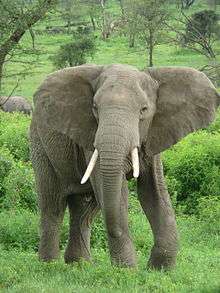elephant
English
Etymology
From Middle English elefant, elefaunt, from Old French elefant, elefan, olifant, re-latinized in Middle French as elephant, from Latin elephantus, from Ancient Greek ἐλέφᾱς (eléphās) (gen. ἐλέφαντος (eléphantos)). Believed to be derived from an Afro-Asiatic form such as Proto-Berber *eḷu (“elephant”) (compare Tahaggart Tamahaq êlu, Tamasheq alu) or Egyptian ꜣbw (“elephant; ivory”). More at ivory. Replaced Middle English olifant (from the aforementioned Old French form, from Vulgar Latin *olifantus), which replaced Old English elpend (“elephant”).
Pronunciation
- IPA(key): /ˈɛləfənt/, /ˈɛlɪfənt/
Audio (US) (file) Audio (file)

an elephant
Noun
elephant (countable and uncountable, plural elephants)
- A mammal of the order Proboscidea, having a trunk, and two large ivory tusks jutting from the upper jaw.
- (figuratively) Anything huge and ponderous.
- (paper, printing) A printing-paper size measuring 30 × 22 inches.
- (Britain, childish) used when counting to add length, so that each count takes about one second
- Let's play hide and seek. I'll count. One elephant, two elephant, three elephant...
- (uncountable, obsolete) Ivory.
- John Dryden's translation of Virgil's Aeneid
- He sent rich gifts of elephant and gold.
- John Dryden's translation of Virgil's Aeneid
Synonyms
Hyponyms
Derived terms
Terms derived from the noun elephant
- African bush elephant
- African elephant
- African forest elephant
- Asian elephant
- Asiatic elephant
- Borneo elephant, Borneo pygmy elephant
- double elephant, double elephant paper
- dwarf elephant
- Elephant and Castle
- elephant apple
- elephant bed
- elephant beetle
- elephant bird, elephantbird
- elephant chess
- elephant-color, elephant-colour
- elephant cord
- elephant creeper
- elephant ear, elephant ears
- elephant fish
- elephant flipping
- elephant folio
- Elephant Gambit
- elephant garlic
- elephant grass
- elephant-gravel
- elephant-gray, elephant-grey
- elephant gun
- Elephant Hall
- elephant hawk moth
- elephanticide
- elephantide
- elephant in Cairo
- elephant in the corner, elephant in the kitchen, elephant in the living room, elephant in the room
- Elephant Island
- elephantitis
- elephant joke
- elephant juice
- elephant leg
- Elephant Man
- elephant man's disease
- elephant man's syndrome
- elephant on the dinner table
- elephant paper
- elephant-path
- elephant pearl
- elephant polo
- elephant-rain
- elephantry
- elephant's breath
- elephant seal
- elephant's ear, elephant's ears
- elephant's foot
- elephant's foot umbrella stand
- elephant's-grass
- elephants' graveyard
- elephantship
- elephant shrew
- elephant's teeth
- elephant's trunk, elephant trunk
- Elephant's Trunk Nebula
- elephant's trunk plant
- elephant's trunk snake
- elephant's tusk
- elephant's-tusks
- elephant's-vine
- elephant test
- elephant trank
- elephant tranquilizer, elephant tranquilliser, elephant tranquillizer
- Elephant Trap
- elephant tree
- elephant-trumpet
- elephant-trunk fish
- Elephant Trunk nebula
- elephant-tusk
- elephant yam
- Flying Elephant
- forest elephant
- get a look at the elephant
- imperial elephant
- Indian elephant
- Most Exalted Order of the White Elephant
- Order of the Elephant
- pad elephant
- pink elephant
- pink elephants
- pseudelephant
- pygmy elephant
- retail elephant
- rogue elephant
- savanna elephant, savannah elephant
- sea elephant
- see the elephant
- show the elephant
- Sri Lankan elephant
- straight-tusked elephant
- Sumatran elephant
- temple elephant
- war elephant
- water elephant
- white elephant
Descendants
- → Welsh: eliffant
- → Hawaiian: 'elepani
- → Maori: arewhana
Related terms
Terms related to the noun elephant
- chryselephantine
- elephancy
- elephanta
- elephanter
- elephantiac
- elephantiasis
- elephantoid
- Elephantopus
- Elephas
Translations
mammal
|
|
Middle French
This article is issued from
Wiktionary.
The text is licensed under Creative
Commons - Attribution - Sharealike.
Additional terms may apply for the media files.